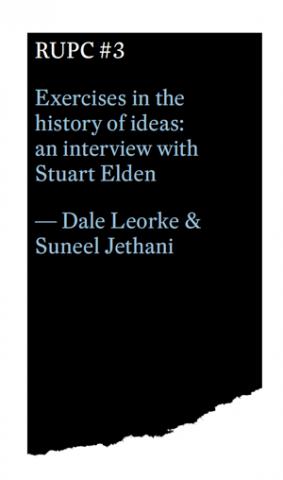RUPC #3: Exercises in the history of ideas
Leorke, Dale and Jethani, Suneel (2015). Exercises in the history of ideas: an interview with Stuart Elden. Surpllus Pty Ltd in co-operation with the Research Unit in Public Cultures, the University of Melbourne, RUPC #3 /Surpllus #13.3.

An interview with Stuart Elden
The following interview with Elden was conducted by Dale Leorke and Suneel Jethani on 4 March, 2014. It was recorded in Melbourne while Elden was visiting Monash University as part of the Monash - Warwick alliance, on the same day he gave a lecture on Foucault's La Société punitive at the University of Melbourne. The interview recording was transcribed and Elden was given the opportunity to revise the text and was also asked several follow-up questions. But we have sought to keep the original discussion as conversational and as close to the original transcript as possible, and Elden has very kindly complied with this request. Most texts mentioned throughout the interview are listed in the bibliography at the end of this paper.
As the beginning of this introduction points out, Elden is a highly rigorous scholar, so fittingly the interview begins with a discussion of his approach to researching, reading and writing. It also focuses on his relationship with Lefebvre, particularly his thoughts on Lefebvre's ongoing contemporaryrelevance in light of the publication of his previously unpublished manuscript Towards an Architecture of Enjoyment (2014) and the widespread interest in his concept of rhythmanalysis.
The interview then focuses largely on Elden's current projects, particularly his work on Foucault, geopolitics, the relationship between territory and urbanism and Shakespeare's plays. It provides a snapshot of Elden's present thinking on his works in their various stages as they continue to evolve and develop. As might be expected, like Elden's work itself the interview is also replete with references to works from a vast terrain of disciplines, thinkers, and perspectives, both past and present.